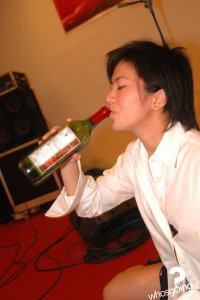The Jerusalem Hills are glowing in the warmth of the early-morning sun. On a twisting dirt track below the vine-covered terrace of Golan Flam's winery, a shepherd drives a flock of sheep toward the pine forest in the distance. The sound of their bells drifts across the still air.
Israel is a long way from California, but when Flam begins to talk about his family background and his winemaking philosophy, California doesn't seem so far.
"Our family has a long history in the wine business," Flam says. "My father, Israel Flam, was the first Israeli to graduate from the enology department at UC Davis, and for 30 years headed the winemaking at Carmel Winery, Israel's largest." He even remembers playing, as a child, in the university's experimental vineyards.
Once on the fringe of the wine world, Israel's current generation of winemakers is traveling, studying and working in vineyards throughout the world. The international experience they bring back has created a new generation of Israeli wineries. They advocate "growing wine, not grapes," and are intent upon producing premium wines that will be recognized throughout the world.
Israeli wines have already appeared on critics' radars (The Chronicle reviewed them in April; see sfgate.com/ZDTI) and are picking up medals in international competitions.
Among the new breed are Gil Shatsberg, now the head winemaker at Recanati Winery, and who, like his predecessor, Lewis Pasco, studied at UC Davis; Ariel Ben-Zaken of the well-known Domaine du Castel who studied in France; and Assaf Paz, winemaker at Binyamina Wine Cellars.
Paz also worked in French, Australian and Californian wineries, specifically Jordan Winery in Healdsburg. In 2002, while still at Jordan, he encouraged his wine enthusiast brother-in-law Doron Belogolovsky to turn the family farm in the Sharon region of central Israel into a winery. Today, Belogolovsky is the winemaker, self-taught but guided by Paz, at Vitkin Winery, considered one of Israel's up-and-coming boutique wineries.
Flam, Shatsberg, Paz and Ben-Zaken will be showing their wines at the third annual Jewish Vintners Celebration, which starts today in Napa.
The Israeli wine industry's ties to California have been solidified over nearly four decades. Israeli wine guru Daniel Rogov traces the origins of Israel's modern wine revolution to a 1972 visit by UC Davis professor Cornelius Ough to Israel.
Deborah Golino, director of the Foundation Plant Services at UC Davis, points out that Israel "has some of the strictest regulations in the world" for vine import and quarantine. The Ministry of Agriculture allows in only clean clones from Golino's service, Flam says.
Not only have students come from Israel over the years, according to Andy Waterhouse, chair of the department of viticulture and enology, but non-Israeli graduates have also gone to Israel to work. One of the early ones was Pasco, an American who first studied at UC Berkeley and worked as a chef in San Francisco before getting his degree in enology. After winemaking stints in Napa Valley, he immigrated to Israel.
And Israeli winemakers' philosophies often sound remarkably like those heard in California.
"It begins with the grapes first, and how and where they are grown," Flam says.
For Flam, a love of Italy and the Italian wine culture led him both to study enology there and in France. He also worked in wineries in South Africa and Australia. But his California ties, including having viticulturalist Harold Olmo as a family friend, remained a major influence.
As he poured tastes of Flam Sauvignon Blanc-Chardonnay on the terrace of his winery, he told the story of sitting at a waterfront restaurant in Jaffa one day, eating calamari and shrimp, and thinking, "We need a crispy, unoaked wine with this food, not butterscotch."
He set out to make a wine that would be perfect with local seafood. "Oak is like a spice," he says, "like salt and pepper in a kitchen. The fruit needs to have space." His blend would be a sure match with calamari and shrimp, mussels or grilled red mullets, rather like drinking cassis white wine while eating bouillabaisse along the coast in Marseille.
Flam Winery, which Flam co-owns with his brother, Gilad, who handles the business end, buys its grapes from Israel's pre-eminent winegrowing regions, the Upper Galilee and the Judean Hills.
Since opening the boutique winery in 1998, one of the early wineries in the country, the Flams have developed relationships with the vineyard growers, and they supervise the cultivation of the vineyards and decide the moment to pick the grapes. It is a tricky decision when growing grapes in hot-weather climates, something Golan Flam struggles with in a similar way as his counterparts in California's hot regions.
"We have just a small window of harvest to avoid jamminess." he says. After the grapes are handpicked, they are shipped in temperature-controlled tanks to the winery. "In Israel, everything is chilled, including the bottled wines, even though our cellar in dug into rock."
Flam says his red wines are aimed for a heartier Mediterranean style best suited for the hot climate, a style often seen in California's warmer regions. He currently produces four different red wines: two Cabernet Sauvignon-Merlot blends, a Syrah-Cabernet Sauvignon blend and a Merlot, for a total bottling of between 8,000 and 10,000 cases a year. The wines are sold in Europe and the United States as well as Israel.
"In the 1970s, when my father came back to Israel from California, winemaking wasn't glamorous, and he didn't really get to put his training into practice," Flam says. "I'm lucky. Today, winemaking in Israel is very chic, very different than for my father's generation."
Georgeanne Brennan
skip to main |
skip to sidebar
Enhance the pleasure that you get from wine by sharing your experiences, knowledge, news articles and facts about the elixir of the gods and bacchanalia on earth by emailing: bacchusforyou@bellsouth.net
How Much Did The Best Bottle of Wine You Ever Drank Cost?
CONTACT INFORMATION
TO SUBMIT A POST, TO BE PUT ON THE MAILING LIST, TO HAVE QUESTIONS ANSWERED, ETC.
EMAIL:



